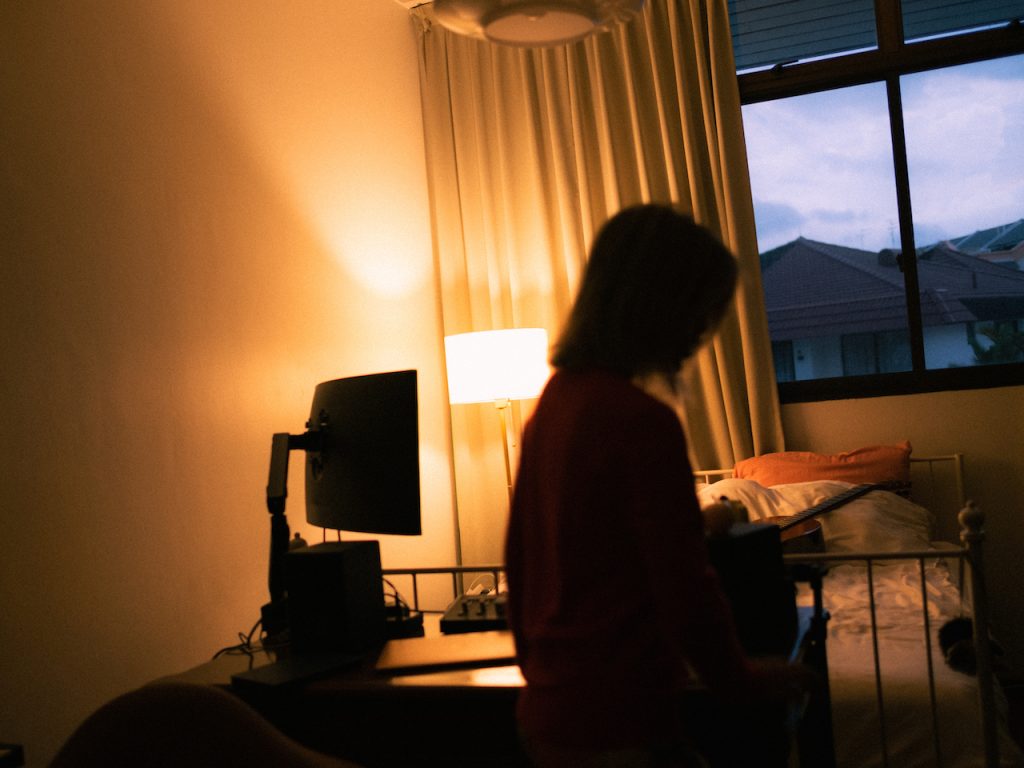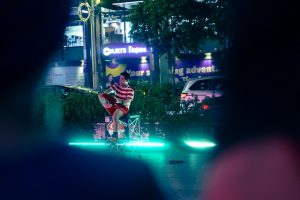Top image collage: Nathan Koh for RICE Media, Jovian Lim for Linying, Rogan Yeoh via Unsplash
Don Richmond, the songwriter and music director of this year’s National Day Parade (as well as 2022 and 2016), had an unusual interaction with his mother-in-law during a wedding earlier this year.
Like every proud parent or in-law, she wanted to show him off to some of her relatives. So she told them that he wrote ‘Stronger Together’, last year’s NDP theme song.
They looked at her, puzzled. She responded by singing the song’s hook.
“Then she went, ‘oh oh oh, oh oh oh’. She just stood there and sang,” he shares.
“And then you see this collective group of aunties and uncles who are like, ‘Oh yeah! Okay, okay, I know!’”
He realised that not everyone can speak, much less, understand English. But small melodic hooks could still speak to people regardless of race, language or religion.
‘Stronger Together’ was written as a celebratory song to rally Singaporeans to rise above the challenges brought by the pandemic. But let’s be honest: It’s no ‘Home’.
The world attaches Mariah Carey to Christmas. For Singaporeans, National Day is inextricable from the Kit Chan and Dick Lee classic.
As the quintessential NDP song, ‘Home’ will forever be held as the benchmark for any new NDP song that comes after. It’s something that local songwriters will always find themselves contending with when they have the honour of composing an anthem for the annual national celebrations.
Which brings us to the question: Will any NDP song ever match up to its evergreen patriotic potency? And, more importantly, do we need these songs anymore?
A New Era
What many Singaporeans may not know (or recently found out, at least) is that ‘Home’ was not originally written for the NDP. It was actually written for the Sing Singapore music festival in 1997.
Dick Lee wasn’t even in Singapore when he wrote it—he was living in Hong Kong. Being homesick after spending seven years overseas, ‘Home’ was his very personal ode to the country he grew up in. You know how the song goes. City, river, street and shore.
Linying, who wrote 2021’s ‘The Road Ahead’, feels that the uniqueness of ‘Home’ lies in its reflective nature from an individual perspective.
“Loving your country wasn’t about being told to love your country, but it was looking at someone’s example of how they love their country.” In other words: Show, not tell.

Back then, no one thought that an NDP song could be so intimate—everything that came before ‘Home’ was very different from the songs that came after. As catchy and simplistic as ‘Stand Up for Singapore’ and ‘Count On Me Singapore’ are, the songs are the musical version of public notices: They tell people what to do and how to feel.
Lyrics like “Reach out for your fellow men” and “You and me will do our part” are pretty instructional. But then again, at the start, NDP songs were a way to encourage Singaporeans to be loyal and fervent to their country.
‘Home’ was the turning point; a new era of NDP songs.
After ‘Home’, many songwriters took a personal approach to writing NDP songs. Songs are either written to Singapore (the ‘you’ in songs is directed to Singapore), or it tells a story from a singular point of view. They’re no longer melodic instruction manuals.
But let’s be honest. Most Singaporeans—me included—don’t expect much from an NDP song. All it does is complement the overarching theme of the year’s NDP. But every once in a while, when something as corny as ‘One Singapore’ is released, Singaporeans have a lot to say.
People tend to forget that composers and songwriters aren’t the only stakeholders in crafting a song that’s supposed to unite a nation. You’re not producing a hyperpop banger after all—and it’s not as if there’s a template for writing an iconic NDP song. But the hired hands do try.
The Voice of a Nation
Different songwriters have different creative approaches, understandably. Most NDP songs focus on the lyrics and melody, but it’s almost impossible to write a song which is targeted to a wide demographic–the whole nation.
For Don, the key to writing an NDP song is to write songs for the young. He finds that if the younger generation enjoys an NDP song, it can easily infect older generations. It’s something he learned after receiving many backhanded compliments from his friends, who are parents.

“I really don’t like your song, man. But guess what? My kid cannot stop singing your song. So I guess it’s a success,” Don says, doing an impression of his friend.
When Linying was approached to write, she was sceptical. Who wouldn’t be? Writing a song that can speak to an entire country is a daunting task.
She approached writing ‘The Road Ahead’ with a quote in mind: “Write the book that you want to read.”
She didn’t want to write a song about Singapore with rose-tinted glasses–especially during the peak of the pandemic. She wanted to write a song which Singaporeans could relate to.
Two of her closest friends were frontline workers; a doctor and a paramedic. But in 2021, when being an artist was the least essential job, the singer-songwriter questioned herself, “What are we really doing to help? Are we really contributing anything?”
She, like many other creatives in Singapore, was trying to find her place in a world where creativity is a luxury. But she believes that the NDP gives a platform to younger songwriters, composers, musicians, producers and performers.
“It’s an opportunity to give legitimacy to what is otherwise quite an undervalued profession,” she shares.
The main message that Linying wanted to share was that Singaporeans only can rely on one another. A line that many people tend to overlook is in the bridge. “Our home, the home we share. Where the garden always grows towards the light.”
She wants to remind Singaporeans (and those living in Singapore) that many different people call this place home. And it is recognition that we are always making progress, even if we don’t see it.
It’s no easy feat to write any song, much less an NDP song. The process of an NDP song can take between weeks and months for writing, recording and mastering. And even after all that, they might not know if it’ll be well-received by the public.
But Linying learned that the success or failure of any song is out of your hands. Once it goes out into the world, anything can happen.
Right Things at the Right Time
When ‘The Road Ahead’ was released, it was welcomed with a warm reception from Singaporeans.
Before she was roped into NDP, Linying was already a singer-songwriter of considerable repute—her brand of soulful pop had already taken her across international stages and radio stations.
An NDP song, however, was her most hyperlocal assignment yet. And it was where her background in Electronic Dance Music helped her when she was writing ‘The Road Ahead’, with its mix of uplifting lyrics and a catchy dance beat.
“Writing songs that were first specifically targeted for giant crowds of people to rave and dance to… I think maybe that played a big part in how this song turned out.”

When discussing how no one expected ‘The Road Ahead’ to do so well, Don reminded me that there was actually a petition to cancel NDP21, which was probably overshadowed by the song’s success.
He had heard ‘The Road Ahead’ before it was released and thought that it was pretty catchy. But after the music video came out, he thought that it was phenomenal.
But in the end, it was a TikTok meme that blew the song up. The mismatch between soothing melodies and aggro dance moves made the song an inescapable banger on people’s social feeds.
“And then the song becomes so much bigger than just an NDP song; it becomes a song of an era now”, Don tells me.
Responding to a Response
Like many Singaporeans, when Don was in his 20s and 30s, he felt that he was too cool to like NDP songs.
Linying, who’s in her 20s, also isn’t the biggest fan of some NDP songs. Her frustration lies in the fact that most of them take an overly rosy view of what Singapore is.
Many Singaporeans would agree. Songs like ‘Because It’s Singapore’ feel like a tiresome slate of generic clichés from start to end.
“It’s because [some NDP songs] are not reflective of what we’re all thinking. It just doesn’t hit home because that’s not what people feel.”
Still, they do have their favourites. Linying likes 2009’s ‘What Do You See’ by Electrico. Don likes ‘Stand Up For Singapore’ by Hugh Harrison and Jeremy Monterio—mostly because it’s tied to a childhood memory.
Don’s father (veteran radio presenter Brian Richmond) co-owned a studio with Jeremy Monteiro, the song’s composer. As a child, he heard the song getting pieced together by artists coming in and out of the studio, not knowing what it was for. A few months later, the song was taught to him in primary school.

Singaporeans have their own personal preferences regarding which NDP songs they like. And it is almost always likely tied to a time in our lives. It could be a dance we learnt (I like ‘Reach Out For The Skies’ because of the dance), or watching the National Education show when we were in Primary 5, or maybe only recently, during the pandemic.
Perhaps the reason why some NDP songs feel more iconic than others is because they correspond to a specific—personal or collective—memory in time.
‘Count On Me Singapore’ was written as a response to the 1985 recession. It was Singapore’s first recession since independence. The song was written as a way to fight against pessimism among the youth.
‘The Road Ahead’ has the same bloodline—it was written as a response to a global crisis without being unrealistic.
The Benchmark
This year’s NDP theme song definitely isn’t ‘Home’, but Singaporeans shouldn’t use ‘Home’ as a benchmark. If every NDP song is written, sounds, and is as iconic as ‘Home’, how can one song stand out?
Singaporeans go through different milestones every year, and in every NDP song, there’s always something to say. In some years, nothing really much happens, so the criticism comes quickly when the song doesn’t have a strong enough motive to exist or inspire.
‘Shine Your Light’ was written to commemorate the end of a chapter and the start of a new one. Since its release, Singaporeans instantly compared it to gospel music because of its gang vocals and the absolute exuberance of it all.
Just because the current sentiments lean negative, it doesn’t mean that the song is bad. For all we know, it’s a total banger for some Singaporean kids who’ll grow up thinking that this is their NDP classic.
Will it still hold up decades down the road? Perhaps not, but what’s for sure is that it’s no ‘Home’. Maybe it doesn’t need to be, not when we know that something as iconic as ‘Home’ already exists—anything else that comes after is a bonus. There’s comfort in the knowledge that home’s about its people too.






